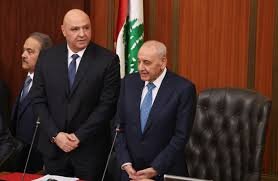The future of the Lebanese Resistance after Aoun election
SOUTH LEBANON – Amid undeniable fears about Lebanon’s future, Hezbollah’s vote for Aoun as president has established new security and political balances given the war-ravaged Lebanon’s political fragility in the face of growing interference by US-led Western countries and Persian Gulf monarchies. The election of Gen. Aoun as president was imposed, nevertheless the final say


SOUTH LEBANON – Amid undeniable fears about Lebanon’s future, Hezbollah’s vote for Aoun as president has established new security and political balances given the war-ravaged Lebanon’s political fragility in the face of growing interference by US-led Western countries and Persian Gulf monarchies.
The election of Gen. Aoun as president was imposed, nevertheless the final say lies with the Shiite duo’s shrewdness that priorizes reconstructing what has been destroyed by the US-backed Israeli aggression; complete withdrawal from the south; and active participation in the new cabinet.
The Shiite duo’s approved Aoun to preserve domestic cohesion and national affinities, thwarting the persistent foreign efforts to deepen sectarian and political divisions.
In his inauguration speech, Gen. Aoun affirmed his commitment to these pivotal priorities especially the necessity of agreeing on a defense strategy, as it is no longer acceptable to ignore the Israeli colonial ambitions.
Aoun’s commitment to these guarantees will accordingly determine Lebanon’s future, as these crucial issues are not only of a local nature, but also has a regional and global dimensions.
Indeed, they require resuming national dialogue which Parliament Speaker Nabih Berri founded 15 years ago, when he called for consensus on a comprehensive defense strategy that would preserves the resistance movement’s military capabilities, and prevents any confrontation with Lebanon’s national army.
Over the past decades, the resistance movement has adopted Ivan Arreguín-Toft’s Asymmetric Conflict Theory, which stipulates that throughout unconventional strategies, the weak can prevail over the major powers.
Paul Salem, vice president for international engagement at the Middle East Institute in Washington, told the New York Times that Hezbollah “remains a very heavily armed group, more powerful than any other in the country.”In the midst of the recent US-led Israeli war on Lebanon, Washington’s proxies have spared no efforts to impose the election of a president, according to the United States’ imperialist terms in a way that would undermine Hezbollah in the Lebanese political arena.
Despite all the staggering blows it received from September to November 2024, the resistance movement has emerged victorious; it has not lost the will to fight, despite the enemy’s geopolitical and technological superiority.
Paul Salem, vice president for international engagement at the Middle East Institute in Washington, told the New York Times that Hezbollah “remains a very heavily armed group, more powerful than any other in the country.”
Writing on the Washington Institute for Near East Policy website, one day before the election session, David Schenker, the former US Assistant Secretary of State for West Asian Affairs, stated that choosing a “reform-minded” president is a good first step, yet it does not replace concerted efforts to consolidate Hezbollah’s setbacks, otherwise it will simply reassert its deadly grip.
Schenker noted that the deployment of the Lebanese army in the south does not necessarily mean that the government will dismantle Hezbollah’s military infrastructure. He pointed out that in order to encourage the pro-US Lebanese factions to seize the opportunity against Hezbollah “Washington may have to make economic and military assistance conditional on the performance of the Lebanese Armed Forces, with regard to enforcing UN resolutions and imposing sanctions on rebellious Lebanese politicians.”
Also in an interview with Haaretz, Dror Doron, a former Lebanon analyst in Netanyahu’s office, noted that “the Israeli army is likely to establish a security buffer zone in southern Lebanon. While Hezbollah will resist such a plan, the Lebanese government will not dare to oppose it for fear of being seen as complicit with Israel.”
Doron added, “The only way to change the situation is through electing a courageous anti-Hezbollah candidate like General Aoun, who with strong US support, will force Hezbollah to withdraw to the north of the Litani,” admitting that such a scenario is likely to lead to “an internal explosion in Lebanon.”
If President Aoun deviates from his inauguration speech’s rational and national agenda, Lebanon’s stability would be shaken. Hence, he must have exceptional flexibility, act with prudence, and not submit to Western dictates that only take into account Israel’s hegemonic interests and its superiority on entire West Asia.
This Western dangerous contradiction, whatsoever, can be controlled if President Aoun has sincere intentions and firm sovereign plans.
Each stage has its own necessities, especially after the fall of the government of Syrian President Bashar al-Assad. Lebanon must invest on its constructive ties with the friendly Arab and Islamic states, for it is in dire need to establish a series of institutions that address the concerns of all sectarian components.
